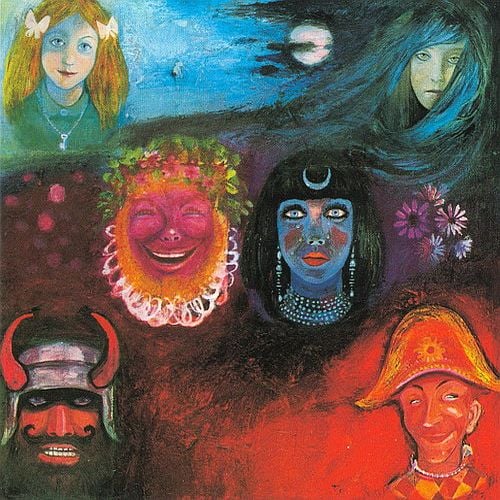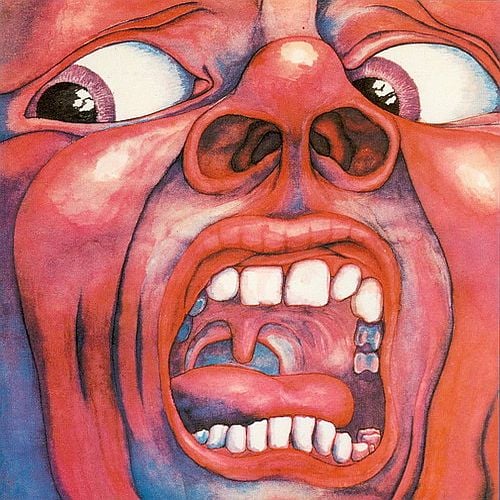Well we finally get to discuss this one. In The Court got a free ride into the second round by sheer name alone and now we can get to finally talk about it. Now it must face up against its follow-up, the often ridiculed younger brother.
 VS
VS 
I'm sure we all recall that when a hit film, book, album, game or song hits there are always endless imitators trying to ride the wave of popularity. Guitar Hero resulted in surge of new music games, and even the resurfacing of some dormant staples, all vying for some of that sweet plastic instrument money. We will see years where there are multiple films about one kind of disaster, such as when Volcano and Dante's Peak came out in the same year, not that we want two volcano films in one year (not want...need!). Success yields imitators, and who can blame the imitators? If we see a formula that works, why try to reinvent the wheel?
So when Robert Fripp had finally reassembled King Crimson for it's second and most inconsistent form, it seems he did the same. He looked at a formula that worked and promptly copied it. To his credit it was not only him who is guilty for In The Wake Of Poseidon, as it seems that chunks of the material had been written prior to the band's first disbanding. Still, it is likely, that Fripp had the biggest hand in the material, being the only full time member to return for the second album. Greg Lake sang on the majority of the songs, taking Crimson's PA equipment as payment, likely to allow Emmerson, Lake, and Palmer to tour with their brand of hijacked prog influences. Both Giles brothers showed up as well. It was like one big happy dysfunctional family reunion.
The end result is just as I described, an imitation. While it is unclear if this was on purpose or not, it is too blatant to ignore. This does not mean, however, that the album can not be an improvement on the original formula, fixing issues that existed the first time around. Several bands have done this, and it is a way of showcasing how a band has matured and perfected their sound. So was that the case here?
In The Court Of The Crimson King has a reputation, a clout if you will. It stands as the sole representative of the British Prog explosion. Its iconic album art strikes fear into the listener as they set the needle down on the record, unsure of what is about to happen. I have to wonder what people in '69 thought when they first saw the terrified face on the album cover. "What the hell is this? It is scary." would be an appropriate reaction both looking and listening to the album. When people think King Crimson they think the debut album. It makes it onto best of lists all the times, and it is considered a classic in every sense of the word. It is interesting consider how this album came out just as The Beatles were falling apart. You get the sense that King Crimson and their progressive brothers were ushering the new era whether their predecessors knew it or not.
It is hard to even comment on these albums without direct comparison, as In The Wake Of Poseidon is just a mirror image of the inaugural In The Court. We can be honest here though, 21st Century Schizoid Man compared to Pictures Of A City? Who are we fooling here. One set the tone for what progressive music would forever be, the other just sounded a heck of a lot like the other. The similarities are shocking, to the point that if anyone else had produced Pictures they could have been easily taken to court for copyright infringement. It is not that it is a bad song, but when you are comparing it to the most iconic King Crimson song, and arguably the most iconic song of the British Progressive Rock Movement, you are never going to match it.
21st Century Schizoid Man is certified monster; the anthem to madness and virtuosity. Its intense, in your face approach covers up how intricate it is, with such fine details as Michael Giles' precision drumming and Greg Lake's bass tones. Pictures Of A City follows nearly the exact same format of scant lyrics followed by a long musical interlude with the song ending in a free jazz nuclear fallout. No one is ever going to top 21st Century, not even Fripp himself.
The self piracy continues with Cadence and Cascade and I Talk To The Wind, again, each happening right after their colossal album starters (briefly ignoring the short Peace: A Theme, which essentially replaces the murder train from 21st Century). Cadence's flamenco style is a soothing variance from the vigorous Pictures Of A City. Which compares pretty fairly to Wind's soothing flute themes. The band knows it just pummeled you in the face and is giving you a chance to catch your breath. I would even argue that I prefer Cadence to I Talk To The Wind. It is a personal preference, but I can not deny how much the former borrows from the latter . The similar song structure is blatant, and the placement is too obvious. If imitation is the best form of flattery, then Poseidon's sole existence is to praise In The Court Of The Crimson King.
As I write this I am desperate to break from this imitation theme, but it is impossible to avoid, hell Epitaph and Poseidon's self titled track make it impossible to separate, each with their own love for Mellotron solos and extended instrumentals. At this point in the album you may wonder if you are indeed listening to a Communist bootleg of King Crimson, you grab the record jacket and expect to see Kang Crimsoon instead, as it would at least make this whole matter make more sense.
Only at this point do we finally get a reprieve from the overarching copying motif as In The Court ventures on to Moonchild a sprawling 12 minutes of improvised psychedelia while Poseidon moves onto the playful Cat Food. Cat Food is great, not only because it is a teasing playful romp that showcased that the British Prog intelligentsia could have a sense of humor, but also because it showcased an (Gasp) original idea. Again it is not that I dislike any of Poseidon's songs, heck I think they are criminally overlooked by fans and by Fripp himself, but when compared to their big brother they lose to their luster. Poseidon is the Billy of Baldwins, not terrible, but not as recognizable as Alec, and fortunately not Stephen.
Frustratingly enough, after Cat Food it seemed as if Crimson went "oh shit that didn't sound like anything we had done previously at all!" and proceed onto The Devil's Triangle which proceeds to try and capture Moonchild, In The Court Of The Crimson King, and Gustav Holst's Mars all in one go. The song, originally intended to be a cover of Mars had to be tinkered to avoid that pesky copyright matter. Its plotting drum line is matched with a slow build up of instrumentation that teeters the line of plagiarism until going into a full fledged freak out, even using clips of In The Court. That is the exact moment where the album loses me. I can humor the pretty blatant mimicry that precedes, as the songs are still entertaining. I also adore them for how overlooked they would become once Robert created the iconic Third form of Crimson. What I can not forgive, however, is the crossing of the threshold in The Devil's Triangle, as imitation descends into forgery. This is the point where the album simply admits "We have run out of original ideas." Typically, you want to avoid pointing out these obvious matters. Like Vanilla Ice who will defend to his grave that Ice Ice Baby is not a blatant rip-off of Under Pressure, you need to vehemently argue that your creation is not just a collection of stolen ideas; not just put up your hands and go "We did the hard work for you of comparing our two albums, by putting in samples of that album." Poseidon tapers off with the reprising of Peace, a nice soothing end, and a nice connecting theme through out the album.
In The Court is not victimless here either, as Moonchild's sprawling improvisation is an acquired taste at best, being a somewhat incoherent mid-air collision that you either like or do not. I personally feel that it goes for just a bit too long and does a bit not enough to warrant glowing appraisal, but when comparing it to Poseidon you at least can say it is original material which grants it near immunity from criticism. The albums self-titled closer is a domineering presence, unlike 21st Century it over powers you with its big bold idea, crushing you under the weight of its presence, as opposed to just scaring you to death.
Poseidon leaves you confused, while it is still a well crafted and intelligent listen with a few glimpses of freshness you are left to wonder why you would to chose to listen to it over In The Court and at the end of the day I can not think of a good reason why. Perhaps if you are just adamant about hearing more of the same, then you will not be disappointed, Otherwise you are not left with a viable reason to venture into its wake (see what I did there?).
In The Court Of The Crimson King is the landmark album it is for so many reasons. Its domineering sound would be the inspiration for musicians well into today. It also showed us that rock music could be relentlessly complicated and did not need to rely on simple major chord progressions. Sargent Pepper sounds like Peter, Paul and Mary when compared to this lunatic of an album. There is a problem however. Music lovers would forever gloss over the rest of the catalog, only fixating on this album. Not only that, but fans would forever fuss when their beloved band did not adhere to the model that was showcased on this album. If a song is an egg, King Crimson will forever be known for not cooking an egg the same way twice...well except here. That is their brilliance, but when you make such a legendary piece of work, people are going to forever drag their feet in protest when you present them a new way to enjoy that egg.
Winner:


No comments:
Post a Comment